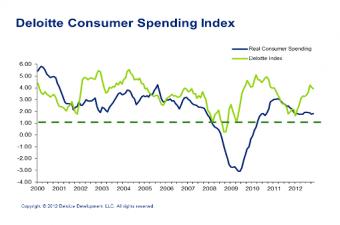""Deloitte's"":http://www.deloitte.com/view/en_US/us/index.htm Consumer Spending Index declined for the third straight month in January, the company reported.
[IMAGE]The index, which tracks consumer cash flow as an indicator of future spending, fell to 3.87 from a previous reading of 3.93.
Patricia Buckley, director of economic policy and analysis at Deloitte and author of the monthly index, explained the decrease is ""primarily due to slowing increases of new home prices.""
""Looking ahead, gradual improvements in initial unemployment claims and real wages may help the Index [COLUMN_BREAK]
reverse its course. In the near term however, spending may remain constrained as consumers contend with tax hikes and rising prices at the pump,"" Buckley said.
The index comprises four components: tax burden, initial unemployment claims, real wages, and real home prices--which all came up mixed.
According to Deloitte, the tax burden has fallen slightly over the past two months and now rests at just below 11 percent. At the same time, real wages have risen to $8.76 as inflation was wrangled into check.
Initial unemployment claims in December fell 11 percent from November, closing the month at 361,400. On a year-over-year basis, claims remained relatively unchanged, Deloitte reported.
Meanwhile, real home prices continue to rise and are up 12 percent over a year ago, though the pace is slowing.
""Shoppers are taking their annual post-holiday pause and most slow their spending even more as they adjust to higher payroll taxes,"" said Alison Paul, vice chairman and retail and distribution leader for Deloitte. ""The hit to consumers' paychecks is likely to be more pronounced among lower- and middle-income Americans who may put household necessities on hold, not just discretionary items.""

 theMReport.com Your trusted source for mortgage banking news
theMReport.com Your trusted source for mortgage banking news









